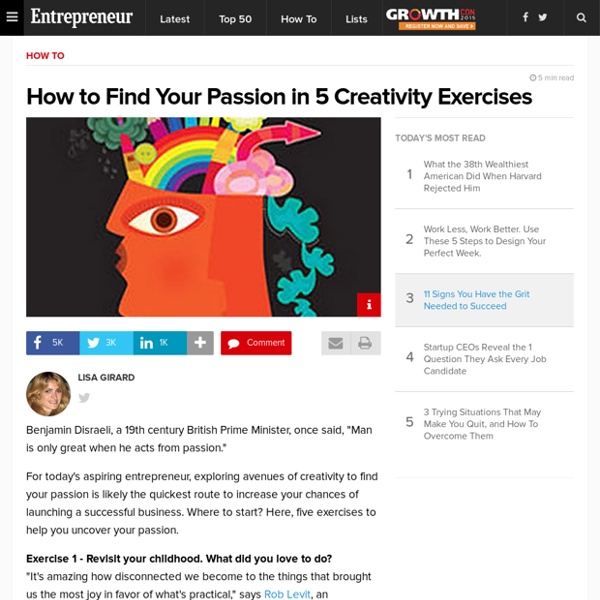Five Creativity Exercises to Find Your Passion

Fast Exercises To Find Your Purpose And Passion For Work
Sunday night, crammed into an airplane seat, tired, with a headache banging through my forehead, I feel miles away from the topic I planned to write about this week: passion. But I’m going to give it a shot because I’m armed with reams of notes and if I can connect to my passion now, I can do it any time I want. Finding your passion is an essential ingredient of winning armies, companies, and individuals. It is not a soft nice-to-have, but a strategic requisite. How can you rapidly connect to your passion and purpose? Want It Carl von Clausewitz talked about the strategic power of passion and Sun Tzu underscored its importance as well. Mihaly Csikszentmihalyi, the psychologist who coined the term “flow,” describes it as “the feeling of total engagement in the activity so that you don't notice anything outside of what you're doing." Paul Graham, founder of Y Combinator, argues that entrepreneurs out of touch with their passion do things for “prestige.” 1. 2. 3. 4. 5. 6. 7. 8. 9. 10. 11.
Maureen Anderson: 5 Ways to Find Your Passion
As host of The Career Clinic radio talk show I'm often asked, "How do I find my passion?" My answer is always, "Heck if I know. But here's how I did..." Step one. Once upon a time I hated my cubicle job but I wasn't ready to quit. The instructor called me at work the next day to ask if I wanted to help him with a book. And the boring day job? Step two. One day I asked the manager of a little airport in town if he'd arrange a flying lesson for me in exchange for an essay in the newspaper about the experience. What did I value most in all the world? Hosting a talk show sounded fun. My essay about the flying lesson appeared in the paper. In the course of about a week I had everything I needed to know about my ideal career, but I was afraid it was silly. Step three. I mean, really consider it. My first radio job was with the Minnesota News Network in St. Back then my title was "intern" and my salary was "nothing." Step four. I am afraid to die. Exactly. Step five. Then what?
Embracing your inner geek
Some Insights into Peer Assessment | LTiA Issue 4 | CeLT | MMU
| View this article as a .pdf file | Dr A. Mark Langan and Dr C. Philip Wheater Department of Environmental and Geographical Sciences Can students assess students effectively? Some insights into peer-assessment. Can naïve markers evaluate their peers? Current thinking There is a growing volume of pedagogical and practical arguments that has been advanced to support peer-assessment by students in higher education (e.g. The classes that are needed to support such initiatives can lead to interactive lessons with detailed reflection on recently completed assessments. So why aren’t we all doing it? Although peer-assessment may be a quicker, more comprehensive learning process in some ways, there are of course pitfalls. What works? The success of peer-assessment schemes depends greatly on how the process is set-up and subsequently managed. Case Study 1. Student marks (i.e. students assessing their peers) correlated strongly with tutor marks (i.e. high precision). Case Study 2. Conclusions
Marking
Peer Marking
Showing Proress
Developing Pedagogy
Starting Lessons
Related:
Related:



